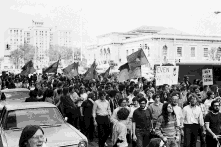We are all outlaws in the eyes of America…
We are obscene lawless hideous dangerous dirty violent and young…
We are forces of chaos and anarchy
Everything they say we are we are
And, we are very Proud of ourselves
—”We Can Be Together” (Jefferson Airplane, from “Volunteers,” 1969)
And, traitorous.
Don’t forget traitorous—the most unforgivable, unpatriotic transgression of all by a nationalist measure.
 Those Americans who committed acts of treason by opposing the U.S. invasion and destruction of Vietnam should, indeed, be very proud of themselves.
Those Americans who committed acts of treason by opposing the U.S. invasion and destruction of Vietnam should, indeed, be very proud of themselves.
The U.S. Congressional mandate for a 15-year commemoration of those who waged the American war in Vietnam or enabled that ignoble conflict get no recognition in these pages. Remembrance of that conflict should bring shame, not honor to those responsible for its planning and execution.
Instead, we honor those who committed treason to the empire. We salute the heroic soldiers and sailors who refused to fight, who carried out sabotage and indiscipline, and finally, as our article in this issue points out, began mutinies that made the generals realize that a continuation of the war was impossible.
War criminal Richard Nixon warned that he would not be the first American president to preside over a losing war, but when it looked like he might lose his army, the end was sealed with a well-deserved American defeat.
Looking back half a century, it’s difficult to conceive of how widespread opposition was to the war even by those who participated in it. Most people are aware of the million person marches in New York City and Washington and the draft and military resistance which are chronicled in histories of the era.
But, there were daily anti-war actions during the peak war years in the smallest of towns and on the most conservative college campuses. Persons, usually never apprehended, bombed draft boards and buildings connected with the war. People withheld their taxes. Activists held unending meetings of protest, while others disrupted ones where spokesmen for the Johnson and Nixon administrations spoke.
This publication, from its first issue, opposed the conflict, and often ran articles and posters calling for a victory for the Vietnamese National Liberation Front. Throughout the war, it used a silhouette of a so-called Viet Cong guerrilla armed with an AK47 rifle as our emblem of support for the country’s designated enemy.
Almost every definable sector of society and even job category had organizations devoted to war opposition including the improbably named Business Executives Move for Vietnam Peace. Popular disgust drove Lyndon Johnson from the White House in 1968 only to see him replaced by an even worse warmonger, Richard Nixon, and his dreadful consigliore, Henry Kissinger.
So callous were these men and their minions in their disregard for human life on either side, that winning the war was a political calculation; domestically for the soon to be disgraced president, and for Kissinger, now branded internationally as a war criminal, his vision of realpolitik where the U.S. could project its military and economic power uncontested anywhere in the world.
Unfortunately, Kissinger’s vision of a Fourth Reich received only a temporary set-back lasting several years following the 1975 humiliating American rout from Saigon. The militarists licked their wounds until, like Mussolini conquering an almost defenseless Ethiopia in 1936, U.S. Presidents Reagan and Bush I achieved imperial triumphalism with victories over Grenada and Panama. These small conflicts overcame the so-called Vietnam Syndrome, a public aversion to military adventures abroad, and set the stage for the manufactured reasons for the first and second Iraq wars.
We offer all admiration and respect for those who fight against the wars of the empire, and only loathing and contempt for the war makers in Washington.
We print these following accounts of opposition to the Vietnam War partially as tribute, but hopefully also as a model for what an engaged population can accomplish to stop a merciless and powerful opponent.
Related articles in this issue
Mutinies at the Outposts of Empire
Rob Blurton
Two Posters: Art Against War
Peter Werbe
The Girl Who Would Stop Time
Steve Slavin
Hanoi Jane Legacy
Jerry Lembcke
War Tax Resistance
Erica Weiland
Jane Fonda & the Anti-Aircraft Gun
Fifth Estate Collective
